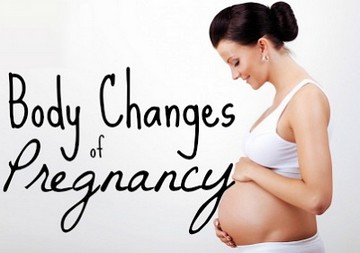Body Changes During Pregnancy

Contents:
- How Your Body Changes in Pregnancy
- Heart and Arterial Pressure
- Lungs and Kidneys
- Digestive Organs
- Joints
- Mammary Glands
- Genitals
- Increase in Body Weight
How Your Body Changes in Pregnancy
During pregnancy period there are considerable physiological changes in female organism. They provide proper development of fetus and prepare the organism for the forthcoming childbirth and breast feeding. During this difficult period the load to all bodies and systems of the organism of the woman noticeably increases that may lead to exacerbation of chronic diseases and to development of complications. This is why it is necessary to be registered in an antenatal clinic as soon as possible and to consult with the competent experts as well as to make needed tests. It will allow you to take adequate preventive measures and to be prepared for childbirth.
Heart
During pregnancy the cardiovascular system performs more hard work as the additional placental circle of blood circulation appears in the organism. It increases the blood flow so that every minute 500 ml of blood passes through placenta. Heart of the healthy pregnant woman adapts to additional loadings easily by means of increasing mass of a cardiac muscle and extra cardiac output. For providing the increasing needs of fetus with nutrients, oxygen and construction materials, blood volume begins to increase in the mother’s organism, reaching its maximum by 7th month of pregnancy. And now 5300-5500 ml of blood circulates instead of 4000 ml as it previously used to be. In cases with heart diseases this loading can cause development of complications in pregnant women. That is why hospitalization in specialized maternity hospitals is recommended to them.
Arterial Pressure
Arterial pressure at normally proceeding pregnancy doesn't change. Actually, among women who have an increased arterial pressure in early terms of pregnancy, it is usually stabilized by the middle of pregnancy period and is in limits of 100/60-130/85 mm Hg. And the reason is in increased tone of peripheral blood vessels under the influence of progesterone hormone.
However in the last trimester of pregnancy arterial pressure may increase, reaching very high values. High arterial pressure (140/90 mm Hg and above) is one of symptoms of late toxicosis among pregnant women. This state is very dangerous and may demand the emergency delivery.
Lungs
Lungs activity amplifies due to consequent need of female woman for oxygen during pregnancy. In spite of the fact that in process of pregnancy development the diaphragm rises up and limits the respiratory movements of lungs, their capacity increases. It occurs due to expansion of thorax, and also due to expansion of bronchial tubes. Increase in volume of the inhaled air during pregnancy facilitates removal of the used oxygen by fetus through placenta. Respiration rate doesn't change and makes 16-18 cycles per one minute, slightly increasing by the end of pregnancy period. Therefore at emergence of shortness of breath or other breath dysfunctions the pregnant woman has to see the doctor without fail.
Kidneys
Kidneys function harder during pregnancy as they bring out of the organism activities products of the pregnant woman herself and of her growing fetus. The urinary output may vary according to the volume of the drunk liquid. The healthy pregnant woman puts out 1200-1600 ml of urine per day on average, including 950-1200 ml of urine during daylight hours and other portion at night.
Under the influence of progesterone hormone the tone of bladder decreases that can course urinary retention. In these conditions urinary tract infection may occur more probably, therefore pregnant women quite often have exacerbation of pyelonephritis. If urinalysis shows emergence of leukocytes than it confirms the fact of urinary tract infection.
Besides, the pregnant uterus, slightly turning to the right, can cause difficulty of outflow of urine from the right kidney. In this case the risk of hydronephrosis increases and this would imply the expansion of kidney pelvis owing to excessive accumulation of urine in it.
Digestive Organs

During the first 3 months of pregnancy changes in digestive organs are observed in many women: there may be nausea and quite often vomiting in the morning (symptoms of early toxicosis), flavoring feelings change, inclination to unusual substances (clay, chalk). As a rule, these phenomena pass by 3-4 month of pregnancy, or sometimes in later terms. Under the influence of hormones of placenta the intestines tone decreases, that often leads to constipation. Intestines are removed by the pregnant uterus, the stomach is also displaced and squeezed, at the same time a part of its contents can penetrate into gullet and cause heartburn (especially in the second half of pregnancy). In such cases ingestion of antacids (for example, Maaloks, Rennie) is recommended, also as taking meals for 2 hours before going to sleep and using a bed with a high head section.
The liver works with more loads during pregnancy because it needs to neutralize activities products of the woman and her fetus.
Joints
During pregnancy women may have some looseness in joints. Pelvic joints become especially mobile. This makes pelvis easy to pass through for the fetus at the time of delivery. Sometimes the softening of pelvic joints is so strongly pronounced that a small apostasis of the pubis may be observed. In this case the pregnant woman usually has pain sense in bosom area, and her gait becomes more of a waddle. It is necessary to report about it to the doctor for receiving the relevant recommendations.
Mammary Glands
During pregnancy mammary glands are prepared for the forthcoming breast feeding. The number of segments of fatty tissue increase in them, and blood supply improves. The Mammary glands enlarge in sizes, nipples commence to swell.
Genitals
The greatest changes during pregnancy happen in genitals and this is especially true of the uterus. The pregnant uterus constantly becomes bigger and by the end of pregnancy its height size reaches 35 cm instead of 7-8 cm before the pregnancy period, its weight increases till 1000-1200 g (without the fetus) instead of previous 50 – 100 g. The volume of the uterus cavity is widened by the factor of about 500 by the end of pregnancy. Change of the uterus size occurs due to muscle fibers augmentation under the influence of placenta hormones. Blood vessels extend, their quantity increases, and they as though wind around the uterus. Then irregular reductions of the uterus are observed, which become more active by the end of pregnancy and felt as "compression". These so-called Braxton Hicks contractions becoming as normal by 30th week of pregnancy may be considered as some training before the real pains in labor.
Position of the uterus usually changes according to its size. By the end of 3th month of pregnancy period it exceeds the bounds of pelvis and closer to childbirth reaches hypochondrium. The uterus is kept in the proper position by cords which become massively thickened and more stretched during pregnancy. The pains arising in sides of stomach, especially when the pose of the woman’s body is being changed, are often caused by the tension of these cords. Blood supply of genitalia amplifies, and there may appear varicose veins in the vagina and on the vulvar lips (the same varicose veins can also appear on the lower limbs and in the rectum).
Increase in Body Weight
Growth of the fetus and physiological changes in the organism of the pregnant woman influence her body weight. The body weight of the healthy woman increases on average by 12 kg with fluctuations from 8 to 18 kg by the end of pregnancy period. Usually in the first half of pregnancy it increases by 4 kg, and in the second half it is twice more. The weekly increase of the body weight during the first 20 weeks is about 300+30 g, from 21th to 30th weeks it is about 330+40 g and after 30th
week till the childbirth it is about 340+30 g. The women, who have a body weight deficiency before pregnancy, can get even more weekly weight gain.